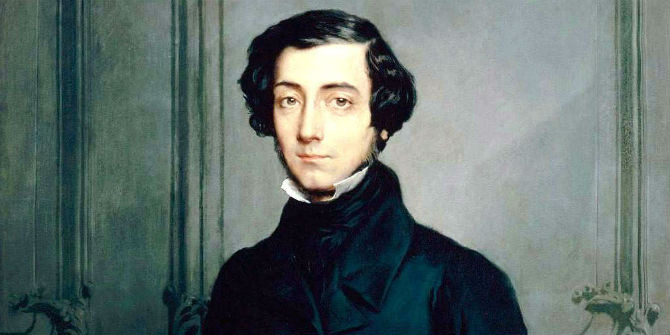 Many people living in the UK, and some Britons outside it, had no vote in the referendum. Scotland and Northern Ireland chose to Remain but will be forced to leave. Arash Heydarian Pashakhanlou argues the UK has succumbed to the tyranny of the majority thanks to the decision to put EU membership to a referendum.
Many people living in the UK, and some Britons outside it, had no vote in the referendum. Scotland and Northern Ireland chose to Remain but will be forced to leave. Arash Heydarian Pashakhanlou argues the UK has succumbed to the tyranny of the majority thanks to the decision to put EU membership to a referendum.
The notion of the tyranny of the majority was popularised by the 19th century political thinkers Alexis de Tocqueville (Democracy in America) and John Stuart Mill (On Liberty). It refers to a situation in which the majority enforces its will on a disadvantaged minority through the democratic process. That is what numerous minority groups in the UK are experiencing after Leave won the referendum. Ironically, this outcome has not only harmed the interests of the minority, but also that of the majority that supported Brexit.

The most obvious victims of this tyranny of majority are the approximately 3.3m EU citizens who live in the UK – most of whom were not allowed to vote on the referendum (citizens of Ireland, Malta and Cyprus did have a say). After Brexit, EU nationals with a right to permanent residence in the UK will be able to stay. The fate of other EU nationals will be determined by the exit negotiations and the will of Parliament. In the meantime, these people have to live in limbo.
Since the vote, True Vision and Stop Hate UK have reported an increase of hate crime directed against minority groups, including the approximately 800,000-strong Polish community in the UK. In one incident, the home of a Polish family was set on fire. In another, cards reading ‘No more Polish vermin’ were delivered to houses in Huntingdon. More generally, a sense of being unwelcome and of alienation has emerged among EU nationals in the UK.
The roughly 1.3m Britons who live and work in Europe have also suffered as a result of Brexit. They did have voting rights in the referendum unless they had lived abroad for more than 15 years. This minority group will also have to live in uncertainty and anxiety until their fate is determined. It may become more difficult for them to gain permits and set up businesses. They may lose their automatic right to work within the EU area and be asked to apply for Blue Cards. In 15 EU member countries, they could also be subjected to a rule which states that they can only be hired if no other suitable candidate has been found within the EU area.
That might also be the future of the roughly 1.8m people of Northern Ireland, despite the fact that a majority of them voted to Remain. But since they only represent roughly 1.5% of the UK citizens, they fell victims to the tyranny of majority as well. Their future will essentially be decided by people who do not live there.
Those who do, however, have witnessed remarkable progress in the peace process and economic growth after the end of the Troubles. The EU has been instrumental in this process. In fact, the 1998 Good Friday Agreement was premised on both UK and Irish membership of the EU. The EU itself provided Northern Ireland with almost £2.5bn in the last EU funding round. The EU has also helped to create a number of cross-border programmes such as Intertrade, Peace and Tourism Ireland that have been successful in bringing together communities both north and south of the border.
This sensitive border currently falls under the Common Travel Area between Northern Ireland and the Republic of Ireland. This agreement allows the free movement of people between these two nations. The continued existence of this Common Travel Area is however now threatened as a result of Brexit. In short, Brexit has been detrimental to the interests of the people of Northern Ireland.
This situation could have been avoided altogether. British democracy does not require referendums. Decision-making belongs to the representatives of the people and not to the people themselves. Indeed, one of the original concerns about direct democracy was that it might allow a majority to trample the interests of minorities. This is what has happened in post-Brexit Britain.
At this point, one might argue that this tyranny of majority is preferable to the tyranny of minority where a larger group’s interest suffers. This logic does however not apply in the case of Brexit, since the decision to leave the EU has not benefitted the majority of the UK either. British sovereignty may be undermined as Scotland and Northern Ireland might decide to leave the UK, and Spain is now pressing for joint sovereignty of Gibraltar following the Brexit vote.
The British economy has also deteriorated and it has lost its top AAA credit rating, meaning the cost of government borrowing will rise. Ukip’s ex-leader Nigel Farage has already backtracked on the claim that Brexit would allow the government to redirect £350m to the NHS.
Furthermore, the available evidence suggests the overall impact of EU migration is beneficial to the UK. According to the UCL Centre for Research and Analysis of Migration, EU migrants provide a net economic benefit of £22bn. Indeed, EU migrants are net contributors to public finances, and to a greater degree than UK nationals. They are not merely paying their way – but also for the British public at large.
The will of the majority have thus not only undermined the interests of the minority but also the majority that supported it. As Mill put it:
“There is a limit to the legitimate interference of collective opinion with individual independence: and to find that limit, and maintain it against encroachment, is as indispensable to a good condition of human affairs, as protection against political despotism.”
Where will that limit be drawn as the effects of Brexit are felt?
This post represents the views of the author and not those of the BrexitVote blog, nor the LSE.
Arash Heydarian Pashakhanlou is a Lecturer in Politics & International Relations at Sheffield Hallam University. He is the author of ‘Back to the Drawing Board’ and ‘Waltz, Mearsheimer and the Post-Cold War World’, which appeared in the journals of International Relations and International Politics respectively.







You are mistaken, and wrong. And have volunteered yourself to be part of the problem.
The UK continues to suffer from ‘nature’ over nurture.
‘We’ are habituated to the tyranny of the minority, no matter the lessons we have had over the centuries, we continue to curse the tool and not the hand that wields it.
The ‘majority’ had no option but to vote as they did, and to not vote.
The employment of Direct Democracy in our usual Liberal (Representative) Democracy is akin to the action of William Webb Ellis; with a twist.
While WWE picked-up the ball and ran with it;and by so-doing ‘invented’ the new game of Rugby, our ‘masters’ carry-on as if the game is the same as ever it was.
All blame for the folly we find ourselves in lies squarely with the Conservative Party.
The only thing for us to do now is not to fall-in behind the notion that we as referee must have been distracted when the rule-infringement took place. We must embody the role of second referee/’goal-line’ technologist*, and insist that the ‘result’ be voided.
To this end I suggest this…
https://www.change.org/p/jeremy-corbyn-mp-brexit-up-with-this-i-shall-not-put
* http://www.topendsports.com/sport/soccer/technology.htm
There are times when Parliament recognises that very big decisions concerning the nation’s future must be taken by the nation as a whole. It therefore holds referendums. There is nothing undemocratic about this. Quite the opposite. Scottish independence was another apposite case.
If Remain had won, articles like this would not be appearing. The author should demonstrate his faith in democracy by accepting the result.
You think around 10% of the population should hold the other 90% against their wishes? If they don’t want to go with the flow they can leave & float their own boat and to read the majority didn’t vote by one of those commenting is laughable we had one of the highest turnouts for decades.
For a change in a country’s constitution, territory or any change of a rather fundamental character a simple majority (as wafer thin as it was on this occasion) doesn’t seem a sufficient mandate at all. It can be no more than be of advisive character. Legally, the responsibility for extracting us out of the EU framework remains with the elected government.
Wow now the elite are calling the working class tyrants. All we did was give the liberal elite a good kick in at the ballot box.
You say the ‘tyranny of the majority’ when in fact it was a minority of the potential electorate who actually voted for Brexit – and then there’s the other 25 per cent of the population who had no rights at all including the young people who will be left with years of pain and are stuck with the mistakes made by the minority misled misathropes who actually got us here – what a lunatic undemocratic system if ever there was….
we voted to join the common market. we never had a vote to join a union.
So you found a tidy little phrase to try to undermine the decision! When it goes the way of the elite it is democracy, but when it goes against. Its tyranny! You my friend are part of the problem
I have lived in Wales nearly all my life and voted Conservative every election. I have lost every time , and lived under a labour administration for all that time.
I accept this as being part of democracy, and don’t bleat that we should have another election because my wishes were not granted.
I appreciate that the London liberal elite like to label all Brexiters as thicko, racist nationalists, but if you ever venture outside the M25 you might learn something instead of arrogantly patronising people